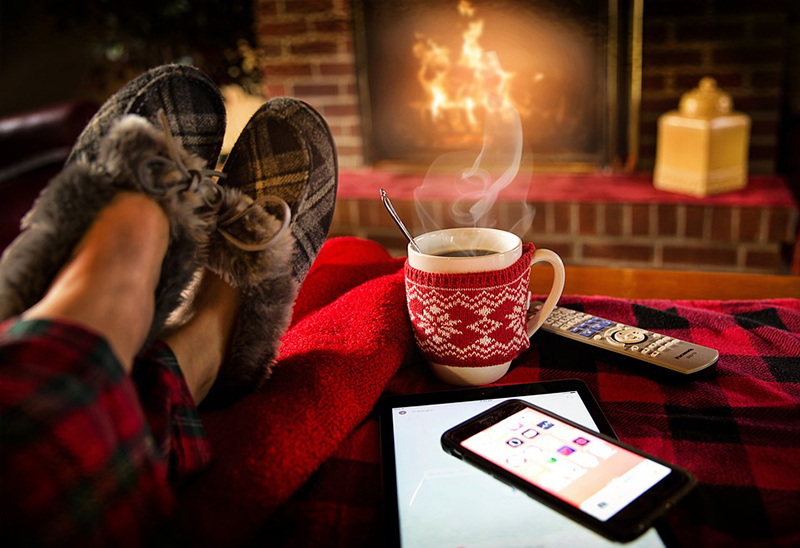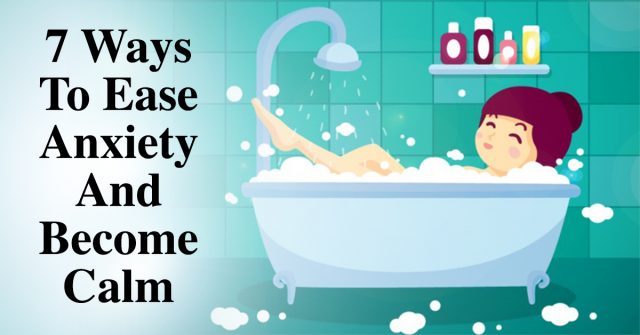Anxiety can be a stressful and uncomfortable experience for anyone. Learning the best way that works for us to regain our calm can be a wonderful and empowering way to breathe a sigh of relief.
Here are 7 ways to ease anxiety and to become calm that are sure to help you feel relieved:
1. Practice Deep Breathing
Science has shown a link between deep breathing and reduced anxiety. Deep and slow breathing is accompanied by feelings of calm and relaxation, while fast and shallow breathing is accompanied by feelings of anxiety and tension.
This is all connected to the fight-or-flight response of our nervous system. By practicing deep breathing if or when you feel anxiety, you are creating the action which signals to your body that it’s okay to relax, and the body naturally creates the feelings and associated neurochemicals that generate relief and reduce muscle tension.
Practice deep breathing by breathing in and counting 1…2…3…, then breathing out and counting 1…2…3… Repeat this practice until you begin to experience reduced tension and a bit of relief.
The mind may naturally begin to trigger thoughts and feelings associated with the worry or anxiety (fight-or-flight response), but remind yourself that you are practicing to become calm, and continue the deep breathing. The relaxation and deep peace from focusing on the breath feels great, so enjoy your practice 🙂
2. Talk Through the Experience
Many times, people become anxious when they have something unnerving to do and they don’t know what to expect. Do you have a presentation to give? Are you nervous about going to the dentist or a doctor’s appointment? There are many different causes for anxiety, and anticipation or fear of the unknown can be one of them. In this situation, it helps to talk to someone about it.
Don’t keep your fears and anxieties to yourself, this only strengthens them and leaves fearful and nervous thoughts unchallenged.
By talking with a professional psychologist, a trusted friend, or a loving family member about our anxieties, we open up about our experience and can receive much needed support and understanding. Sometimes talking with another person can help keep our fears in check, and help us to realize that we may be overthinking a situation or that even there isn’t all that much to be worried about.
3. Listen To Peaceful Music
The power of music as an anti-anxiety agent has been studied for decades. Research proves certain types of music elicit a wide variety of physical and emotional responses, and certain songs are even proven to reduce anxiety.
For example, slow tempos can relax muscles and soothe the mind. By listening to soft, peaceful and relaxing music; either in your room or by using headphones, you can offer yourself fast anxiety relief. If you’re not sure which music to choose, we recommend Enya, and various playlists of healing Reiki music.
4. Start The Day Right

Do you awake each morning to an alarm clock designed to shock your nervous system, drink some coffee designed to increase your alertness and nervousness and then skip breakfast or eat something fast and unhealthy before rushing off to work? If you answered yes to any of these, then it’s time to rethink a few of them in order to feel less anxious each day.
How we begin each day sets the mood for our emotions until we rest again and allow our minds and feelings to reset. Waking up to a stressful alarm clock can make the entire day feel stressful. Instead of this, use an alarm clock on your phone that is set to something more peaceful or even a song that you enjoy.
While it’s hard to talk people out of their daily coffee, if anxiety is something you struggle with, then it’s very important to consider. Caffeine, found in high amounts in coffee, is a stimulant, and consuming too much caffeine causes anxiety. The effects can last for as long as the coffee is in your system. Try replacing it each morning or even a few mornings each week with fresh squeezed juice and see how your anxiety decreases!
Eating a healthy breakfast is also important in maintaining a positive mood throughout the day, as the body requires some energy before you make it to lunch. Try adding some fresh fruit, yogurt or oatmeal to your breakfast to help relieve anxiety.
As a bonus, if you are very serious about reducing your anxiety, wakeup a few minutes early each morning and practice Yoga stretches. The effects of Yoga and relieving anxiety and tension are profound, and by starting your day right by helping your body feel good, it can keep you feeling happy and calm for the entire day.
5. Reward Yourself With A Treat

If you’re dreading going somewhere or doing something and this is causing you anxiety, often times promising to reward yourself with something you enjoy can act as the extra motivation you need to get it done, and can relieve a bit of the anxiety in thinking about it; as you know you will feel good after.
These rewards don’t have to be expensive; they can be a yummy meal at your favorite local restaurant, a warm and soothing bath, spending time by the fireplace with a loved one, listening to music while reading your favorite book, or drinking warm tea while watching your favorite movie. Knowing that you have a reward waiting after you complete a task can add some feel good feelings to the nervousness and help to relive it.
6. Educate Yourself And Try To See Things In A New Light

If you are aware of what is causing your anxiety, sometimes it can be the perspective we take about the situation that causes the nervousness, rather than the experience itself. It’s likely that someone somewhere else may feel entirely different about the situation than you, and this is because of their different opinion and past experiences.
Fear comes when we are faced with what we don’t understand; so educate yourself as much as possible on the situation you are dealing with: read verified online articles, read books, seek advice from professionals. Knowing your situation as well as an expert is sure to shine light on the dark areas of fear and worry, and a certain level of relief and comfort comes with knowing the truth about the situation.
7. Focus On One Thing At A Time
Overthinking causes anxiety. A natural response to a challenging situation is to begin thinking about solutions. Yet when an easy solution cannot be reached, the mind tends to overthink; to go into overdrive trying to find a solution.
The association with worry and overthinking is strong, and doing one usually increases the other. Stress and anxiety usually happen when more than one thing is bothering us in our lives. When we are facing one stressful situation we can most likely handle it, but when it is followed by a second, and then a third situation within a short period of time, this is when we can get overwhelmed by stress, anxiety and worry.
Instead of getting overwhelmed by thinking of several things at once, deal with one thing at a time. Maintain your focus on one situation, and do your best to remedy it. After you’ve dealt with one, then you can deal with another. This will help you to relieve the anxiety felt from having to deal with too many things at once.
If things are just too overwhelming, take a step back, and tell your worries you are taking a worry vacation, even if just for one day. Put your troubles aside and give yourself a day or more of rest where you don’t deal with or think about the things that are worrying you. You deserve peace, and your worries can wait 🙂
Did any of these tips help you to reduce anxiety and remain calm? Let us know in the comments.
We love you dearly.


















